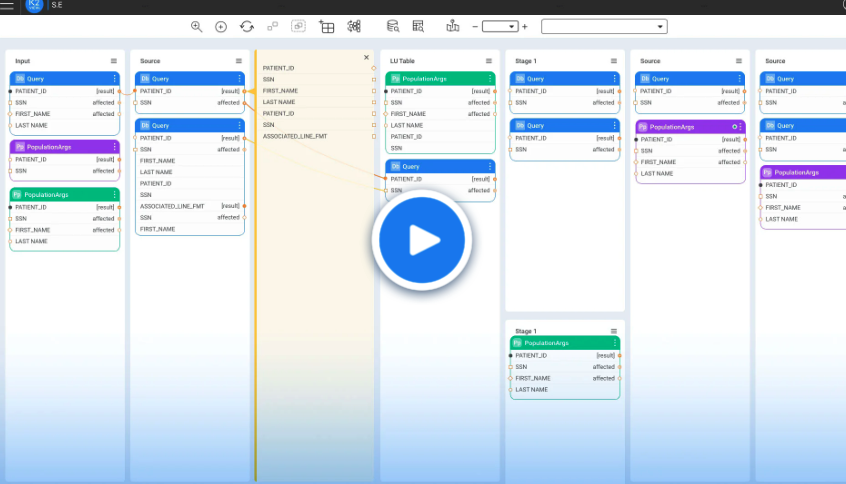We had the pleasure of interviewing Teresa Tung, Accenture Cloud First Chief Technologist, about operational data products in a data mesh. Read on to learn how they advance business agility and market leadership.
Table of Contents
So, What’s a Data Product?
Teresa Tung on Operational Data Products
How Accenture Took an Operational Data Product Approach to a Tier-1 Telco
Why Accenture’s Teresa Tung is Bullish on Operational Data Products in a Data Mesh
So, What’s a Data Product?
According to Tung, a data product is a reusable asset that makes a trusted dataset accessible to any authorized data consumer.
A lot has been discussed about the role of data products in serving analytical workloads, in the context of a federated data mesh – especially for advanced analytics, machine learning, and AI.
However, little has been discussed about the strategic value that data products hold in terms of serving operational use cases. Through data abstraction, federated data management solutions provide a single source of data for front-end applications. This allows data consumers to store and retrieve data from multiple, disparate databases with a single query, and helps enterprises access, and use, valuable data to improve their business outcomes.
Teresa Tung on Operational Data Products
An operational data product delivers a holistic, real-time, and trusted view of any business entity – such as a customer, supplier, device, location – or anything that’s important to running the business. Operational data products move data between sources and targets in fractions of a second, bi-directionally, and can selectively persist data to act as an operational datastore.
What makes operational data products, in a data mesh, unique, is that the data is always:
-
Complete, and unified, for any business entity
-
Fresh, and enriched with situational awareness
-
Secure, via data governance, and data masking, to comply with privacy regulations
-
Packaged, for real-time delivery via API, CDC, streaming, virtualization, SQL, messaging, etc.
How Accenture Took an Operational
Data Product Approach to a Tier-1 Telco
To sustain its business agility and market leadership position, a top-tier US telco running a multi-system, mixed-technology, and highly-siloed data environment, needed to respond to operational business requests, from multiple domains, in days.
Accenture recommended an operational data product approach, implemented on Data Product Platform, which empowers each business domain with autonomy and tools to create, manage, and access data products. The data products can be discovered using a data catalog, and can be consumed by any authorized data consumer, in any business domain. The first use case that Accenture supported with operational data products was data tokenization.
Within the platform, a data product manages the data for each business entity instance in its own high-performance Micro-Database™. Think of a Micro-Database as a mini data lake, managing the data for a single instance of a business entity. So, in the case of this particular telco, the platform manages over 30 million Micro-Databases, one for each customer.
A Micro-Database is a mini data lake, managing the data for a single instance of a business entity.
A Micro-Database is always:
-
In sync, with underlying source systems
-
Secure, with its own 256-bit encryption key
-
Compliant, with data privacy and security regulations, by employing data masking tools, or data tokenization tools, as required
-
ACID-compatible, meaning that it can be used as the database of record for new applications
-
Accessible, in milliseconds, by authorized data consumers across the enterprise
The data product was set up to tokenize sensitive data, where the tokens for each customer are stored in the customer’s Micro-Database, and where each Micro-Database is secured with its own 256-bit encryption key. In this sense, the Micro-Database functions as a “mini vault”, eliminating the risk of a mass data breach.
Today, this tier-1 telco is able to manage the entire lifecycle of the data product: from designing and engineering, through testing, deployment, and monitoring, to ongoing change management.
From an operational perspective, it has the flexibility to deploy Data Product Platform in a data mesh architecture, data fabric architecture, or data hub architecture – located on premises, in the cloud (iPaaS), or across hybrid environments.
And it can start with one deployment architecture (say, data fabric), and phase into another, without altering the implementation.
Why Accenture’s Teresa Tung is Bullish on
Operational Data Products in a Data Mesh
According to Accenture, operational data products, in a data mesh, enable enterprises to:
-
Accelerate
Remove the “silo system syndrome” that causes most companies to respond to operational business needs in months, instead of days. -
Collaborate
Democratize operational data access across all lines of business. -
Govern
Deliver a single, trusted, and real-time view of any business entity, to authorized consuming applications and users.













